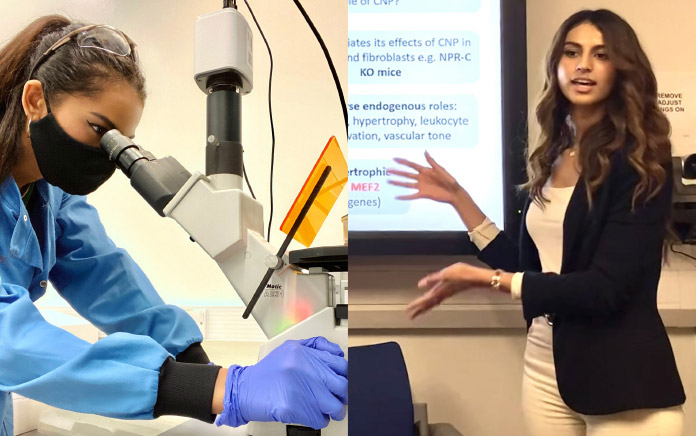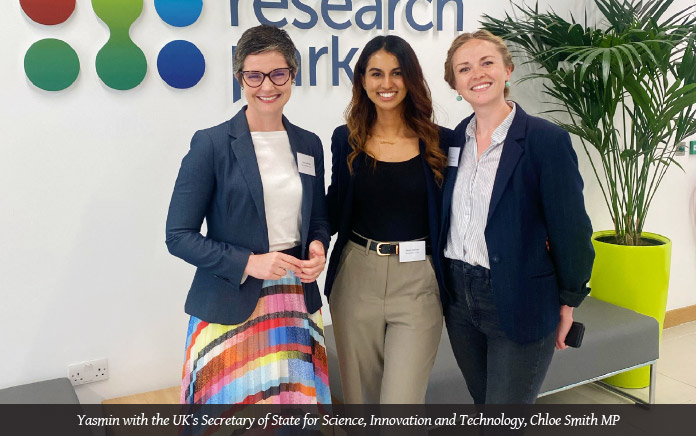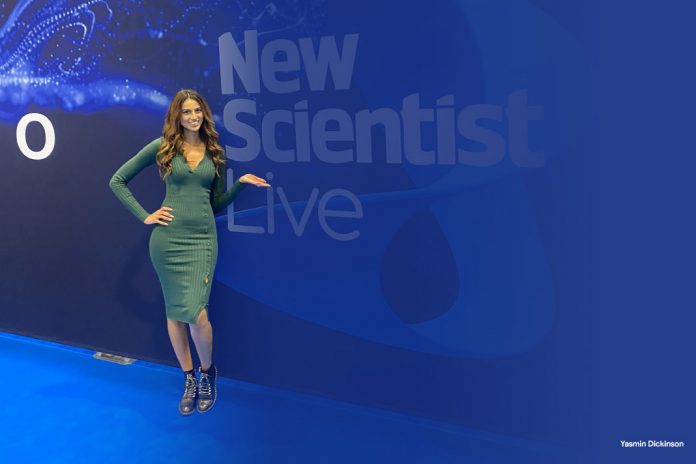Yasmin Dickinson (BSc, MSc) is a highly successful woman in STEM based in the UK, known on Instagram by over 16,500 people as ‘The Cardiac Scientist’. Yasmin, who was born and raised in Bahrain, is now a Research Scientist in Cardiovascular Medicine and recently received placement as an intern in science policy in the UK.
Through her interesting content online, she not only informs the general public of developments in the field, but inspires the youth to pursue a career in STEM. She tells Farah Baig about her journey and aspirations, and shares some insight into the life of a scientist.
Could you tell our readers a little bit about yourself, and tell us about your ties to Bahrain?
My mother is Bahraini and my father is English, and I was born and raised in Bahrain. In fact, I went to the British School of Bahrain where I have so many fond memories! However, we later moved to England as my father wanted my siblings and I to carry out our studies there. Leaving Bahrain was one of the hardest things I’ve had to do, no country compares to your home.
I am now a Cardiovascular Medicine and Pharmacology PhD student at the William Harvey Research Institute in London. My research focuses on understanding the molecular mechanisms at play in heart failure. My PhD is partly funded by AstraZeneca, whereby I undertake research in their labs in Cambridge using the latest techniques and technology. In my spare time, I love creating science communication content on Instagram to share my love for science with others.
That’s very interesting! Is there a specific reason for which you chose this field?
The heart has always been a fascinating organ to me. I was always amazed at how it was able to pump non-stop from the moment we are made. The structure and anatomy of the heart is also really beautiful, all the different chambers and cell types, and how they are able to contract rhythmically. I always loved learning about the cardiovascular system since I was in school.
My research in particular is translational, meaning our work collects non-clinical research results and provides clinical applications, therefore more directly impacting human health and wellbeing.
Cardiovascular disease remains to be a leading cause of death globally, and there is still so much that is unknown in terms of possible treatments and better diagnostics, so research in cardiovascular medicine is needed more than ever.
 Could you kindly share your experience being a PhD student in Cardiovascular Pharmacology in the UK?
Could you kindly share your experience being a PhD student in Cardiovascular Pharmacology in the UK?
I was initially unsure whether to undertake a PhD after my Master’s degree, so I worked as a Research Assistant at the University of Oxford in the Cardiovascular Medicine Department to see if working in academia was for me. It’s here that I found a real love for research and knew I wanted to now conduct my own research in the field. I am now in the second-year of my PhD and I couldn’t be happier. I am honoured to have been accepted into one of the most prestigious institutes for cardiovascular research in Europe. I am really passionate about my research project and it’s a great feeling when you get exciting data for the first time!
You’ve amassed quite a following online. Tell us about your presence as ‘The Cardiac Scientist’.
I started my account around the same time as many other creatives, during lockdown in 2020. I had just started my dream job at the University of Oxford and then two months in the country was in lockdown! I wanted to use my time wisely while stuck at home and had always wanted to do something creative and make videos but never had the time previously.
The initial aim was to give others an insight into the life of a scientist, as sometimes it can seem quite mysterious. Everyone knows what a doctor does, but what really goes on in a lab? I hoped to introduce and inspire others into the STEM subjects and show them that there is no set educational route into the field. I also wanted to teach laboratory techniques and talk about science in the news. I am a huge advocate for education, I truly believe your education is your freedom and hope to inspire others to think the same way through the work that I do.
It was a bit nerve wracking at first because you have to really put yourself out there for the world to see, but I pushed myself to do it and now I am so happy that I did. Through my science communication journey, I have met so many amazing, intelligent people and have had an influx of media-related opportunities.
 On that note, what would be your advice for young women wishing to pursue a career in STEM?
On that note, what would be your advice for young women wishing to pursue a career in STEM?
I want young women to be able to see themselves working in a field they really love, whether that be in the STEM field or not. But specifically, I would want them to know that there is definitely a place for them in STEM, and there are so many different options they could go into: electrical engineering, physics, biology, computer science etc. There will be something that fits their passion and skills, so my advice for them would be to start exploring the different options and to get to know what they like.
Intelligence is beautiful, confidence is beautiful, and doing what you love is also beautiful. Don’t take your education for granted, it’s your tool to create a future you want for yourself. I am also happy for anyone to contact me on Instagram to ask about my studies and give advice about studying in the UK, my door (or DM) is always open!
What can you tell us about your recent placement as an intern in science policy?
I thoroughly enjoy working in research, but I have also been enjoying my science communication work and wanted to know if there were fields where I could merge my love for the two, this is how I came across science policy.
Science policy serves as the bridge between researchers and the public, to translate technical scientific issues into something that can be utilised as progressive policies for society. The aim of our work is also to ensure the transparency of research findings with the public. In order to gain public trust in science we need to be transparent about the ways in which policy makers use evidence to develop regulations, laws, and legislations.
As part of my placement, I will be meeting with members of parliament, researchers, and the general public in Parliament to facilitate discussions in this arena. Politics is a completely new field to me, so I have been learning lots since starting my placement!
How do you feel about this milestone achievement?
I don’t take the time so much to think about how far I have come, maybe I should do that more often. But I am definitely proud of all the things I have achieved so far. It has almost had a positive feedback loop effect on me, where I now want to work hard to achieve more.
It must be said however, that I have been able to achieve all that I have so far because of the love and support of my family. My parents have always allowed me to flourish and invested a lot into my education. Whatever I achieve in this world, it is because of them and I hope God always rewards them for all they have done for me.
What would you say is a long-term and short-term goal of yours as a woman in STEM?
My short-term goal is to finish my PhD to be honest, and to do it well! There is so much more to a PhD than just doing research to write a thesis. There are many opportunities to do public engagement and outreach, to give talks in secondary and primary schools, to present your work at conferences and network with other scientists.
My long-term goal is to work in a field where I am able to have a positive impact on people on a wider scale. My interests include lecturing at universities and continuing my science communication through the media industry. I hope to create a platform for scientists and science enthusiasts to come together to exchange their knowledge and experience in the field.
Is there anything else you would like to add?
I feel Bahrain needs more investment in science and technology; we need more research centres and brilliant scientists to fill those institutes. In particular, we need more medical research scientists and institutes to encourage growth in these sectors, just as our neighbouring countries have done.
Bahrain is filled with intelligent, creative, hard-working people (I know this as I’m one of them) and this is definitely an area we could work on. I am very proud to be Bahraini and wherever I go in life, I always make sure to carry the spirit of my people with me. I will always be happy to collaborate and work with any Bahraini institutes or universities to talk about my work in STEM and encourage others to pursue a career in science.


































